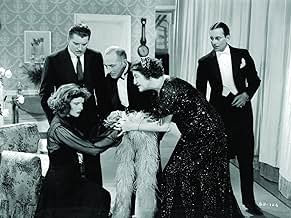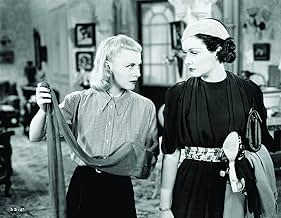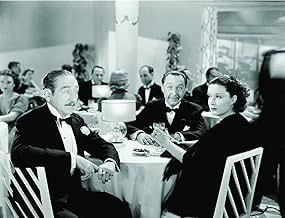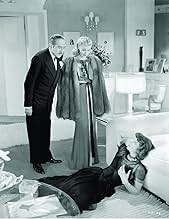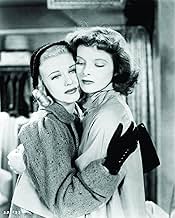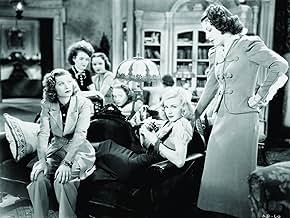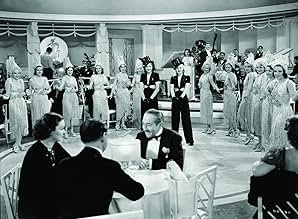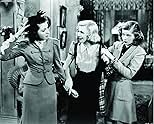NOTE IMDb
7,7/10
9,6 k
MA NOTE
Ajouter une intrigue dans votre langueA chronicle of the ambitions, dreams, and disappointments of aspiring actresses who all live in the same boarding house.A chronicle of the ambitions, dreams, and disappointments of aspiring actresses who all live in the same boarding house.A chronicle of the ambitions, dreams, and disappointments of aspiring actresses who all live in the same boarding house.
- Réalisation
- Scénario
- Casting principal
- Nommé pour 4 Oscars
- 5 victoires et 5 nominations au total
Avis à la une
Framed and shot as though a stage play which it was originally, but much changed for the film and with a stage play within the staged play, le tout ensemble in this witty farce delivers a virtual non-stop, wise-cracking, virtuoso performance. Timing is everything and in comedy, it's particularly so; and the director, Gregory La Cava who cut his teeth, in the silent era, as a director beginning in 1916 doesn't miss a beat with this one.
From a play by Edna Ferber (of Giant fame) and George S. Kaufman, the film tells the story of what happens to a group of aspiring actresses who happen to board at a place called the Floodlights Club in New York City, supposedly. Of course, there are minor players, as in all plays Lucille Ball, Eve Arden, Ann Miller and most of the men, the exception being Adolphe Menjou as a caricature (almost) of the Big Bad Producer of those days. The majors, Katharine Hepburn (as Terry), Ginger Rogers (Jean), Gail Patrick (Linda) and Andrea Leeds (Kay) form the core about which this story revolves.
Which, when all is said and done, is about the ascendancy of Terry as an actress and the decline of Kay as another: out with the old, in with the new, if you will. That would tend to make for a somewhat pedestrian story if it were simply that. Happily, what sets this apart from, say, the almost maudlin characterization by Hepburn in Morning Glory (1933) in a similar situation (for which, however, she did receive a Best Actress award in 1934), is, first, the scintillating dialog. Which means the viewer must really listen: it goes so quickly between characters that you'll miss the one-liners and sight gags if you take a chomp on a sandwich or sip of coffee, or whatever. So, be prepared.
What's left? Well, of course, the great acting by Hepburn, Rogers, Ball, Miller, Menjou, Arden, Patrick and Leeds, the latter getting a Best Supporting nomination for her somewhat overly tearful acting; so much so, she reminded me of Olivia de Havilland, in looks and style.
The direction, already mentioned, is in the hands of an old hand and it shows, explicitly. Add to that the camera work that included almost manic cuts up and down stairs, superb face-on tracking shots and perfect timing while up to a dozen people would mill about in the frame concurrently and with dialog. Confusing? Perhaps to some. Just concentrate on the majors.
What's more interesting for me, however, is the sub-text of this comedy. Made just before USA finally shook free of the Great Depression, as you listen, you'll hear many references to the hard times: at the Floodlights, everybody is down, but not out; rich and unscrupulous producers just want to use and abuse actresses; the women are all scraping for even the lowliest acting or dancing job at the meanest of wages; despondency and depression are endemic. Despite all of that, the women 'soldier' on, pushing themselves to their emotional and physical limits.
Women in the audience at that time must have felt the pull: don't deny your dreams of self-fulfillment, despite what chauvinistic clods of men might say and do, even powerful men. It's a stirring message, albeit idealistic, but it sets the tone for the larger section of a country that was about to engage in the world war which, in a very real sense, changed the role of women as never before. So, some may die, yes, but the show must go on...
There have been a number of introspective and self-referential films about the acting business, Morning Glory being the earliest I've seen. Others include A Star is Born (made and remade many times), All About Eve (1950) arguably the best, I think The Dresser (1983), The Player (1992), and others, but all heavy dramas. So, it's refreshing to find a gem that's prepared to treat the matter lightly, more rather than less.
A final thought: it must have been fun for the actors to act at being actors; it's even more fun to know that the director used much of the banter between the women off-camera to actually use in the film much to the playwrights' displeasure, so I understand.
Recommended for all.
From a play by Edna Ferber (of Giant fame) and George S. Kaufman, the film tells the story of what happens to a group of aspiring actresses who happen to board at a place called the Floodlights Club in New York City, supposedly. Of course, there are minor players, as in all plays Lucille Ball, Eve Arden, Ann Miller and most of the men, the exception being Adolphe Menjou as a caricature (almost) of the Big Bad Producer of those days. The majors, Katharine Hepburn (as Terry), Ginger Rogers (Jean), Gail Patrick (Linda) and Andrea Leeds (Kay) form the core about which this story revolves.
Which, when all is said and done, is about the ascendancy of Terry as an actress and the decline of Kay as another: out with the old, in with the new, if you will. That would tend to make for a somewhat pedestrian story if it were simply that. Happily, what sets this apart from, say, the almost maudlin characterization by Hepburn in Morning Glory (1933) in a similar situation (for which, however, she did receive a Best Actress award in 1934), is, first, the scintillating dialog. Which means the viewer must really listen: it goes so quickly between characters that you'll miss the one-liners and sight gags if you take a chomp on a sandwich or sip of coffee, or whatever. So, be prepared.
What's left? Well, of course, the great acting by Hepburn, Rogers, Ball, Miller, Menjou, Arden, Patrick and Leeds, the latter getting a Best Supporting nomination for her somewhat overly tearful acting; so much so, she reminded me of Olivia de Havilland, in looks and style.
The direction, already mentioned, is in the hands of an old hand and it shows, explicitly. Add to that the camera work that included almost manic cuts up and down stairs, superb face-on tracking shots and perfect timing while up to a dozen people would mill about in the frame concurrently and with dialog. Confusing? Perhaps to some. Just concentrate on the majors.
What's more interesting for me, however, is the sub-text of this comedy. Made just before USA finally shook free of the Great Depression, as you listen, you'll hear many references to the hard times: at the Floodlights, everybody is down, but not out; rich and unscrupulous producers just want to use and abuse actresses; the women are all scraping for even the lowliest acting or dancing job at the meanest of wages; despondency and depression are endemic. Despite all of that, the women 'soldier' on, pushing themselves to their emotional and physical limits.
Women in the audience at that time must have felt the pull: don't deny your dreams of self-fulfillment, despite what chauvinistic clods of men might say and do, even powerful men. It's a stirring message, albeit idealistic, but it sets the tone for the larger section of a country that was about to engage in the world war which, in a very real sense, changed the role of women as never before. So, some may die, yes, but the show must go on...
There have been a number of introspective and self-referential films about the acting business, Morning Glory being the earliest I've seen. Others include A Star is Born (made and remade many times), All About Eve (1950) arguably the best, I think The Dresser (1983), The Player (1992), and others, but all heavy dramas. So, it's refreshing to find a gem that's prepared to treat the matter lightly, more rather than less.
A final thought: it must have been fun for the actors to act at being actors; it's even more fun to know that the director used much of the banter between the women off-camera to actually use in the film much to the playwrights' displeasure, so I understand.
Recommended for all.
In fact this film version of a stage play by Edna Ferber and George S Kaufman, directed by Gregory La Cava is 70 years old and although it may show a wrinkle here or there - like having Adolph Menjou as the romantic lead - the youthful energy in the acting and dialog has surfed the waves of time unscathed. The bunch of girls populating the Footlights lodgings is a smashing crowd. Katharine Hepburn, brisk and Hepburnish already to the hilt. Ginger Rogers drinks, scratches and dances a duet with Ann Miller. Eve Arden, as usual, delivers the best one liners and Lucille Ball seems ready for a startling career. Andrea Leeds got an Oscar nomination and Constance Collier plays an over the hill actress that becomes Hepburn's minder, just like in real life. The film moves at an incredible speed and I defy you not to tear up when Hepburn makes her entrance with the Calla Lillies in bloom.
New York City. The Footlights Club is a theatrical boarding house where young women wait for the chance to make it big on Broadway. To deal with the disappointment & bitterness that can set in, they engage in wisecracks & gossip. Fiercely loyal to their friends, they can be wickedly spiteful to those that cross them. Always before them is their dream - to capture elusive success at the STAGE DOOR.
A wonderful film, fresh & sparkling, with great dialogue infusing its wit & drama. The rapid-fire cross talk is still a real treat for viewers - as is the chance to see several fine young actresses early in their careers.
The entire cast is excellent. Brash Katharine Hepburn is the new girl who quickly meets the `regulars': feisty Ginger Rogers, cynical Lucille Ball, wisecracker Eve Arden, lively Ann Miller, snobbish Gail Patrick & sweet Andrea Leeds. While the young ladies certainly get most of the attention, be sure not to overlook Constance Collier, terrific as Miss Luther the has-been actress. Growing old on bittersweet memories, she is a constant reminder to the others what, even with success, they still might become.
Adolphe Menjou gives his usual vivid performance as an immoral producer, while Samuel S. Hinds is good as Hepburn's father. Film mavens will enjoy spotting several familiar faces in uncredited roles: Jack Carson as a Seattle lumberman; Grady Sutton as a butcher's helper; Frank Reicher as a stage director; Franklin Pangborn, hilarious as a butler; and Ralph Forbes in the role of Hepburn's stage spouse.
A wonderful film, fresh & sparkling, with great dialogue infusing its wit & drama. The rapid-fire cross talk is still a real treat for viewers - as is the chance to see several fine young actresses early in their careers.
The entire cast is excellent. Brash Katharine Hepburn is the new girl who quickly meets the `regulars': feisty Ginger Rogers, cynical Lucille Ball, wisecracker Eve Arden, lively Ann Miller, snobbish Gail Patrick & sweet Andrea Leeds. While the young ladies certainly get most of the attention, be sure not to overlook Constance Collier, terrific as Miss Luther the has-been actress. Growing old on bittersweet memories, she is a constant reminder to the others what, even with success, they still might become.
Adolphe Menjou gives his usual vivid performance as an immoral producer, while Samuel S. Hinds is good as Hepburn's father. Film mavens will enjoy spotting several familiar faces in uncredited roles: Jack Carson as a Seattle lumberman; Grady Sutton as a butcher's helper; Frank Reicher as a stage director; Franklin Pangborn, hilarious as a butler; and Ralph Forbes in the role of Hepburn's stage spouse.
10zetes
I don't quite know how to put my passion for this film into words. It's something I never expected. I taped it off of television because I've been on a Ginger Rogers kick lately (I think I'm in love with her), and very luckily experienced something of enormous quality.
There is not a regular plot. Unlike most classical cinema, the goal towards which the film is striving is quite tenuous. Basically, the goal is for Katherine Hepburn to get a part in a play and give a good performance, but it is never stressed. Instead, what we get is more of an ensemble piece. There are characters who are more central than others, but we get to know well a great number of characters. And we live with them, experience their dreams, hardships, and successes, falling more and more deeply in love with them every minute, caring about them as we would dear friends or siblings.
It is most often referred to as a comedy, and the dialogue tends to be hilarious (Ginger Rogers is in full form here, wisecracking at the speed of light), but the film's drama is very affecting, too. This film's ending is so beautiful, and like all great films, we're reluctant to say goodbye to the characters. Fortunately, since I have it on tape, I can visit the boarding house any time I want. Unfortunately, since this film is neither on VHS nor DVD, you probably cannot. Watch for it on AMC or TCM or other stations that play classic films. You will not be disappointed. 10/10
There is not a regular plot. Unlike most classical cinema, the goal towards which the film is striving is quite tenuous. Basically, the goal is for Katherine Hepburn to get a part in a play and give a good performance, but it is never stressed. Instead, what we get is more of an ensemble piece. There are characters who are more central than others, but we get to know well a great number of characters. And we live with them, experience their dreams, hardships, and successes, falling more and more deeply in love with them every minute, caring about them as we would dear friends or siblings.
It is most often referred to as a comedy, and the dialogue tends to be hilarious (Ginger Rogers is in full form here, wisecracking at the speed of light), but the film's drama is very affecting, too. This film's ending is so beautiful, and like all great films, we're reluctant to say goodbye to the characters. Fortunately, since I have it on tape, I can visit the boarding house any time I want. Unfortunately, since this film is neither on VHS nor DVD, you probably cannot. Watch for it on AMC or TCM or other stations that play classic films. You will not be disappointed. 10/10
Something very sinister happened to movies between 1937 and the 1950s that made this kind of film impossible to make. It's a terrific example of ensemble acting, with no one taking a back seat to anyone else. Ginger Rogers is absolutely amazing, especially after seeing some of the fluffy stuff she did with Astaire. It's hard to believe this is the same actress.
The dialogue zips along with lighting speed including some great laugh-out-loud one-liners. What a wonderful script! Very much like "Grand Hotel" in its structure and shockingly adult themes.
The relationships between all the women are so complex it's hard to believe it was actually made when it was. It makes men look very bad - at best we're imbeciles, at worst, Svengalis. And it has the same kind of uneasiness and disillusionment with the theater that "Sunset Boulevard" had with the movies. I wish there were more like it.
The dialogue zips along with lighting speed including some great laugh-out-loud one-liners. What a wonderful script! Very much like "Grand Hotel" in its structure and shockingly adult themes.
The relationships between all the women are so complex it's hard to believe it was actually made when it was. It makes men look very bad - at best we're imbeciles, at worst, Svengalis. And it has the same kind of uneasiness and disillusionment with the theater that "Sunset Boulevard" had with the movies. I wish there were more like it.
Le saviez-vous
- AnecdotesWhen Katharine Hepburn delivered her climactic stage speech, Gregory La Cava reduced it to only ten lines and filmed it on a closed set. He later brought in the actors and the extras in the audience and had them react to the filmed speech. Many of them broke down.
- GaffesThe band at Club Grotto, where Jean and Annie perform a dance number, includes a female vocalist who can be seen singing in the background, but no vocals are heard on the soundtrack.
- Citations
Terry Randall: [delivering her opening speech in the play within the movie] The calla lilies are in bloom again. Such a strange flower, suitable to any occasion. I carried them on my wedding day and now I place them here in memory of something that has died.
- Versions alternativesSPOILER: A shot of a man mowing the grass around Kay's grave is missing from some versions.
- ConnexionsEdited into Starring Katharine Hepburn (1981)
- Bandes originalesPut Your Heart Into Your Feet and Dance
(uncredited)
Written by Hal Borne and Mort Greene
Danced by Ginger Rogers and Ann Miller
Meilleurs choix
Connectez-vous pour évaluer et suivre la liste de favoris afin de recevoir des recommandations personnalisées
- How long is Stage Door?Alimenté par Alexa
Détails
- Date de sortie
- Pays d’origine
- Langue
- Aussi connu sous le nom de
- Entre bastidores
- Lieux de tournage
- Société de production
- Voir plus de crédits d'entreprise sur IMDbPro
Box-office
- Budget
- 952 000 $US (estimé)
- Montant brut mondial
- 8 835 $US
- Durée1 heure 32 minutes
- Couleur
- Rapport de forme
- 1.37 : 1
Contribuer à cette page
Suggérer une modification ou ajouter du contenu manquant


